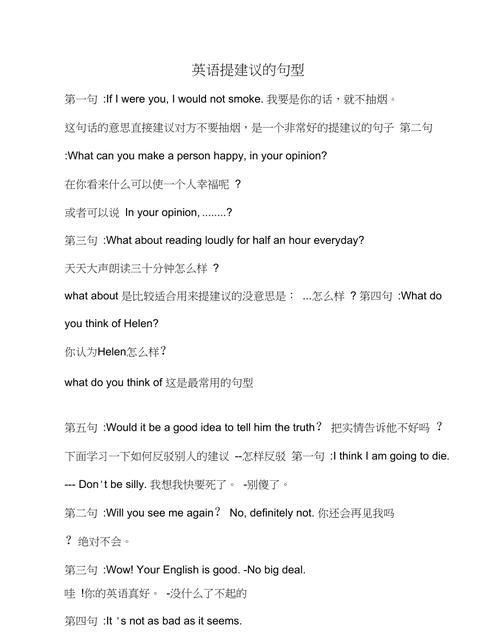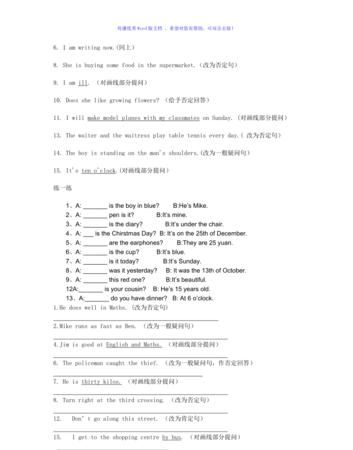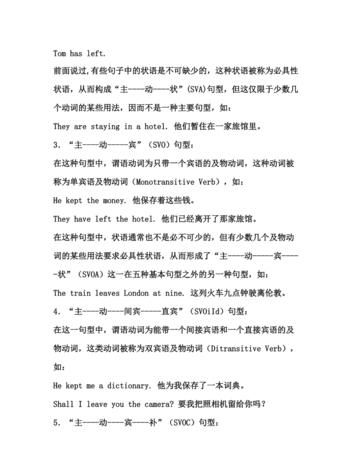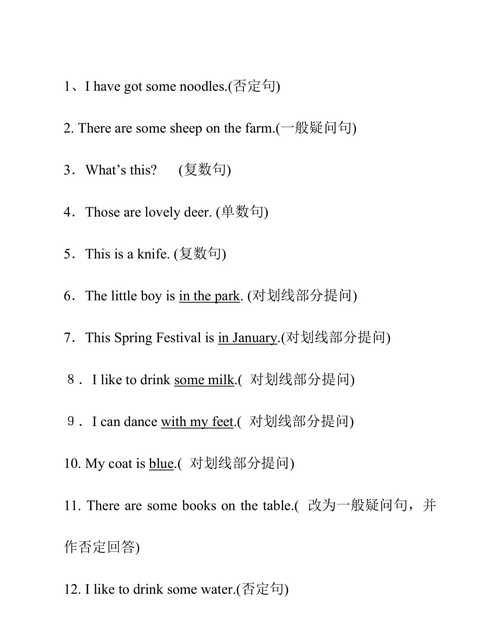本文目录
英语what, where when属于什么
what用法
一、用作疑问代词或疑问形容词,引导特殊疑问句
这是what的最基本用法。例如:What is your mother? 此时,它与疑问词which有所区别:what表示泛指,意思是“什么”;which具有选择性并有范围的规定,表示“哪个人”或“哪个物”。如:Which book is yours, this one or that one?
二、用作关系代词,引导名词性从句
在这里,what既可指代人(相当于the person/persons that …),意思是“所......的人”,也可指代物(相当于the thing/things that …),表示“所......的事物”。例如:What we need is more money.
需要注意以下两点:(1)what引导主语从句时,主句谓语动词的单复数取决于what所指代内容是单数还是复数。(2)what引导宾主从句时,其结构相当于一个名词短语。
三、用于固定结构“What is the +抽象名词”
此时,what有“多少”的含义,例如:What is the population of China? (=How many people are there in China?)
四、用作语气词,表示感叹,意为“多么、何等”
例如:What happy children! (=How happy the children are!)
五、用作连词,含义和作用类似as much as、the degree that等
例如:The number of the students in our school is five times what it was ten years ago.
六、和ever组成合成词whatever
表示“无论......”、“不管......”,相当于“no matter what…”,例如:Whatever you want to do, do it well.
此外,在中语中,whatever可以替代what,但语气较强烈,有“究竟”、“到底”的意思。
七、用于插入语中
what用于插入语,形成的固定句型有what’s more、what’s worse、what’s better等。例如:He is a tractor driver, what’s more, a good sportsman.
八、用作副词
此时,what表示“在哪一方面”、“到什么程度”。例如:What does it benefit us? /What does it matter?
九、用作感叹词
what在这里表示惊讶、气愤等,意思是“什么”。在英语口语中,what也常用在句尾,有“是不是”、“不是吗”的意思。例如:What, do you really mean it? It’s a good film, what?
十、在英美口语中,what通常用来构成一些固定结构
例如:What about…? / So what? / What’s happening? / What next?
where用法
用法1】 where用作疑问副词, 在(往、从)哪里, 在什么地方:
Where are you? 你在哪儿?
Where did you get the computer (form)? 你从哪儿弄到这台电脑的?
Where did you study medicine? 你从哪儿学的医?
【用法2】where用作连接副词, 引导下列从句:
Where bees are, there is honey. 〔状语从句〕哪儿有蜜蜂哪儿就有蜜。
I’m going to do what I like and go where I like. 〔状语从句〕我要做我想做的事,去我想去的地方。
I wonder where she lives. 〔宾语从句〕我想知道她住在哪里。
It’s really no business of yours where I spend my summer. 〔主语从句〕
我真不知道她去哪儿了。
I really have no idea where she has gone.〔同位语从句〕我真不知道她去哪儿了。
The problem is where we should put the vase. 〔表语从句〕问题是我们把花瓶放在哪里呢。
【用法3】where用作关系副词,引导定语从句:
England is one of the few countries where (=in which) people drive on the left. 英国是少数沿左侧开车的国家之一。
We then moved to Paris, where we lived for six years. 我们后来搬到巴黎,在那里住了六年。
【用法4】where用于引申意义:
Where will all this trouble lead? ( =What result will it have? ) 这件麻烦的事会惹出什么结果?
The crisis has reached a point where the receiver will have to be called in.危机已经到达非把破产管理人叫来不可的地步。
Where others are weak, he is strong. 别人的弱点正是他的优势。
Where the money is, there’s the power. 有钱就有势。
Can you succeed where others failed? 别人干砸的事情, 你能干成吗?
【用法5】where引导名词性从句,相当于the place (point)where:
A bird had settled on a tree close to where I was standing. 鸟儿栖息在离我站的地方很近的一棵树上。
That’s where the battle took place. 那儿就是那场战役发生的地方。
The car is where you parked it. 车子还在你停放的地方。
That’s where we differ. 这就是我们的分歧所在。
That’s just where we basically disagree with him. 这就是我们同他的根本分歧点。
This is where we help each other. 我们就在这方面互相帮助。
That’s where you are wrong. 你错就错在这儿。

英语提问频率的句式
一般疑问句句式:be动词/情态动词/助动词+主语+其他?
特殊疑问句句式:特殊疑问词+一般疑问句语序?
否定疑问句:be动词/情态动词/助动词+n't+主语+其他?如:Isn't .....?
反义疑问句:陈述句,附加疑问句(由be动词/情态动词/助动词+主语两部分构成)

w开头的英文单词及意思
首先我是求采纳 才回答这个问题的 别浪费ME的时间 谢谢采纳!1
where who why When which What whose。初学英语的同学做遇到对划线部分提问的题目,总是感觉手忙脚乱,或者是无从下手,笔者认为大家只要记住关键的“三步”,保证你们做起题来会万无一失。
第一步:根据划线部分的词、句确定特殊疑问词。whose, what , how , when , where ,why , which, who , because, how many, what colour, how much, how old ,how long, how often等。
注意:划线部分语句的意思就是你要变成的问句的答案,这是确定确定特殊疑问词的捷径。如:
1.Lily plays soccer every day.确定用what。
2.She cleaned room last night. 确定用when。
3.He is at home. 确定用where。
4.Her coat is red. 确定用what colour。
5.Tom’s bike is $ 50. 确定用how much 。
6.This is Lucy’s book. 确定用whose 。
7.She likes English because it is interesting. 确定用why
第二步:去掉画线部分。因为如果不去掉画线部分语句可能会造成你所问的句子前后矛盾。如:What’s your name Wang Wei? (你叫什么名字王伟?)
1.Lily plays soccer every day.
2.She cleaned room last night.
3.He is at home.
4.Her coat is red.
5.Tom’s bike is $ 50.
6.This is Lucy’s book.
7.She likes English because it is interesting.
第三步:把去掉划线部分后的句子变成一般疑问句,然后把它添加在特殊疑问词后,加上问号。
1.What does Lily play every day?
2.When did he clean room ?
3.Where is h e ?
4.What colour is her coat?
5.How much is Tom’s bike?
6.Whse book is this ?
7.Why does she like English?
大家要注意的几种特殊情况:
使用who时要分清主语和宾语:
(1.)如果是对主语提问只要用who替换主语部分就可以了,千万不要再改动其他的地方。
1.Tom does his homework yesterday.
Who does his homework?
(2.)如果对宾提问,仍然按规则变化。
Tom has helps me with my English.
WhoWhom does Tom help with English?
2.对句子中介词词组提问,要分清介词词组在句中的成分,以确定使用which 或者where:
(A)作状语时用where:
(1.)The book is on the desk.
Where is the book?
(2.)H e saw a book on the desk.
Where did he see a book?
(B)作状语时用which:
(1.) The man in the car is Tom’s father.
Which man is Tom’s father?
(2.) The book on the desk is mine
Which is your book?
3.使用whose时要分清它的后面有无名词:
This book is mine.
Whose is this book ?
This is my book.
Whose book is this?
3.使用how many ,how much的区别和具体的规则:分清划线部分是可数名词还是不可数名词。如果可数就用how many,如果不可数就用how much。
(1.)He has $10.
How much does he have?
(2.)They have 10 cats.
How many cats do they have?
4.用what 提问there be句型时要注意去掉there be:
There are 20 books in the room.
What are in the room?
5.有缺省的词情况的变化:
有缺省的词时要注意固定句型的准确选择和运用:
(1.)She played soccer last night.
What did she do last night?
(2.)He is a student.
What does he do?
(3.)Tom is looking at the picture.
(4.)What is Tom doing?
(5.)Lucy is of medium height.
What does Tom look like?
6.注意部分时态中实义动词的变化。
He plays the guitar every day.
Does he play the guitar every day?
They played tennis in the moring.
Did they play tennis in the moring?
需要提醒大家的是:这种方法是初学者的必经之路,但是千万不要把句子的变化机械化,那样就会失去语言自身的活性和灵性。精确、恰当的语言变化方法,要靠我们在日常交际中慢慢地积累。注意培养好语感,达到用英语思维的时候,一切的困难都会迎刃而解
楼主希望您采纳!!!!谢谢!!!!

英语所有句型结构
英语的基本句型主要有五种,它们是:
1、主语———动词———表语
2、主语———动词
3、主语———动词———宾语
4、主语———动词———宾语———宾语
5、主语———动词———宾语———补语
掌握好这些基本句型,就可以为灵活运用语言打下良好的基础.下面分别讲解这五种句型.
一、主语---动词----表语
在这一句型中,动词是系动词,划线部分为表语.
1.Mr.Brown is an engineer.(名词做表语)
2.Gradualy he became silent.(形容词做表语)
3.She remained standing for a hour.(现在分词做表语)
4.The question remained unsolved.(过去分词做表语)
5.The machine is out of order.(介词短语做表语)
6.The television was on.(副词做表语)
7.His plan is to keep the affair secret.(动词不定式做表语)
8.My job is repairing cars.(动名词做表语)
9.The question is what you want to do.(从句做表语,即:表语从句)
注意:在下面的句子中,形容词做表语,在表语的后面常常接不定式结构.
I'm happy to meet you.
They are willing to help.
We are determined to follow his example.
二、主语———动词
在这一句型中,动词为不及物动词及不及物的动词词组.在有的句子中,不及物动词可以有状语修饰.
1.The sun is rising.
2.I'll try.
3.Did you sleep well?(well做状语,修饰不及物动词sleep)
4.The engine broke down.
注意:在此句型中,有少数不及物动词表达被动含义,表达主语本身所具有的特性,不用被动语态.
1.The book sells wel.
2.The window won't shut.
3.The pen writes smoothly.
4.Cheese cuts easily.
三、主语———动词———宾语
在此句型中,动词为及物动词,划线部分为宾语.
1.Do you know these people(them)?(名词或代词做宾语)
2.I can't express myself in English.(反身代词做宾语)
3.He smiled a strange smile.(同源宾语)
4.We can't afford to pay such a price.(不定式做宾语)
5.Would you mind waiting a few minutes?(动名词做宾语)
6.I hope that I have said nothing to pain you.(从句做宾语,即:宾语从句)
注意:并不是所有的及物动词都可以接上述各种情况做宾语,不同的动词有不同的用法,所以,在学习动词时,一定要掌握其用法.
四、主语———动词———宾语———宾语
在此句型中,动词可以称作双宾语动词,在英语中,这样的动词并不多,在学习遇时,要牢记.后面的宾语为间接宾语和直接宾语,其中间接宾语在前,一般表人,直接宾语在后,一般表物.这类句型有三种情况.
第一种情况,间接宾语可以改为to引导的短语.
1.He handed me a letter.
He handed a letter to me.
2.She gave me her telephone number.
She gave her telephone number to me.
第二种情况,间接宾语可以改为for引导的短语.
3.She sang us a folk song.
She sang a folk for us.
4.She cooked us a delicious meal.
She cooked a delicious meal for us.
第三种情况,直接宾语可以由宾语从句充当.
5.Tell him I'm out.
6.Can you inform me where Miss Green lives?
五、主语———动词———宾语———宾语补足语
在此句型中的动词,叫做可以跟复合宾语的动词,在英语中,这样的动词也不多.后面的宾语补足语是说明宾语的情况的,宾语和宾语补足语一起被称做复合宾语.这个句式是英语中比较复杂的一个句式,因为复合宾语的构成内容较多.下面句子中划线部分为宾语补足语.
1.He found his new job boring.(形容词做宾补)
2.The called their daughter Mary.(名词做宾补)
3.This placed her in a very difficult position.(介词短语做宾补)
4.We went to here house but found her out.(副词做宾补)
5.What do you advise me to do?(不定式做宾补)
6.We thought him to be an honest man.(tobe做宾补)
7.He believed them to have discussed the problem.(不定式的完成式做宾补)
8.He believed her to be telling the truth.(不定式的进行式做宾补)
9.Did you notice him come in?(不带to的不定式做宾补)
10.I saw her chatting with Nancy.(现在分词做宾补)
11.He watched the piano carried upstairs.(过去分词做宾补)
注意:在这个结构中,可以出现用it做形式上的宾语,把真正的宾语放在宾语补足语的后面.在此结构中,宾语常常是动词不定式或宾语从句.
1.He felt it his duty to mention this to her.
分析:it是形式宾语,hisduty是宾语补足语,to mention this to her是真正的宾语.
2.I think it best that you should stay with us.
分析:it是形式宾语,best是宾语补足语,that you should stay with us是真正的宾语.
注意:
1.习惯用语的使用
在英语中,有很多动词习惯用语,在学习的过程中,要注意它们的使用,不必分析单独每个词的使用.
例:
We are short of money.(be short of中short做表语)
She is always making trouble for her friends.(trouble做make的宾语)
He has carried out our instructions to the letter.(our instructions做词组carry out的宾语)
We are waiting for the rain to stop.(wait for后面的the rain是宾语,to stop是宾语补足语)
2.在英语中,大多数动词既可以做及物动词又可以做不及物动词,而且还会有一些固定词组,因此一个动词可以用于几种句型.
例:ask
①Did you ask the price?(直接接名词做宾语)
②She asked them their names.(接双宾语)
③I asked James to buy some bread.(接宾语加不定式做宾语补足语)
④I asked to speak to Fred.(接不定式做宾语)
⑤Didn't you ask him in?(在此句中和副词in连用)
⑥He has asked for an interview with the President.(组成固定词组ask for)
3.There be句型是一种特殊的句子,真正的主语在后面,含义为“有…”
①谓语动词和主语保持一致:There is a television in the sitting room.
②有两个或更多的主语时,动词一般和最近的一个保持一致:There are two girls and a boy dancing in the hall.
③主语的后面有时有修饰语:There are a lot of difficulties facing us.There were many things to be done(此处也可以使用to do).
④谓语动词be可以有时态的变化:There will be a concert in the park tonight.There was little change in him.
⑤谓语也可以有不定式构成的复合谓语.
There used to be a cinema here.
There seems to be something the matter with her.
Is there going to be any activity tonight?
⑥there be句式变疑问句,把be提前;变翻译疑问句也要借助there.
Is there any hope of getting the job?
There is nothing wrong with your watch,is there?
⑦there be句型中也可以使用诸如:live,follow,come,stand,sit,exist等不及物动词:
Once upon a time,there lived a fisherman on the island.
There came a knock at the door.
At the top of the hill there stands an old temple.
⑧用于非谓语的情况下,有时用不定式的复合结构there to be或动名词的复合结构和独立主格结构there being:
You wouldn't want there to be another war.(不定式的复合结构)
The teacher was satisfied with there being no mistakes in his homework.(动名词的复合结构)
There being nothing else to do,we went home.(独立主格结构)
■巩固性练习
请判断下列句子的结构类型
1.He is running.
2.The loud voice from the upstairs made him angry.
3.The little boy is asking the teacher all kinds of questions.
4.She seemed angry.
5.My father bought me a beautiful present.
6.Why do you keep your eyes closed?
7.Will you tell us an exciting story?
8.We must keep our classroom tidy and clean.
9.I heard the baby crying in the sitting room.
10.Can you push the window open?
答案:
1.主语---动词
2.主语---动词---宾语---补语
3.主语---动词---宾语---宾语
4.主语---动词----表语
5.主语---动词---宾语---宾语
6.主语---动词---宾语---宾语
7.主语---动词---宾语---补语
8.主语---动词---宾语---补语
9.主语---动词---宾语---补语
10.主语---动词---宾语---补语

以上就是关于英语提问的固定句型5个w,英语what, where when属于什么的全部内容,以及英语提问的固定句型5个w 的相关内容,希望能够帮到您。
